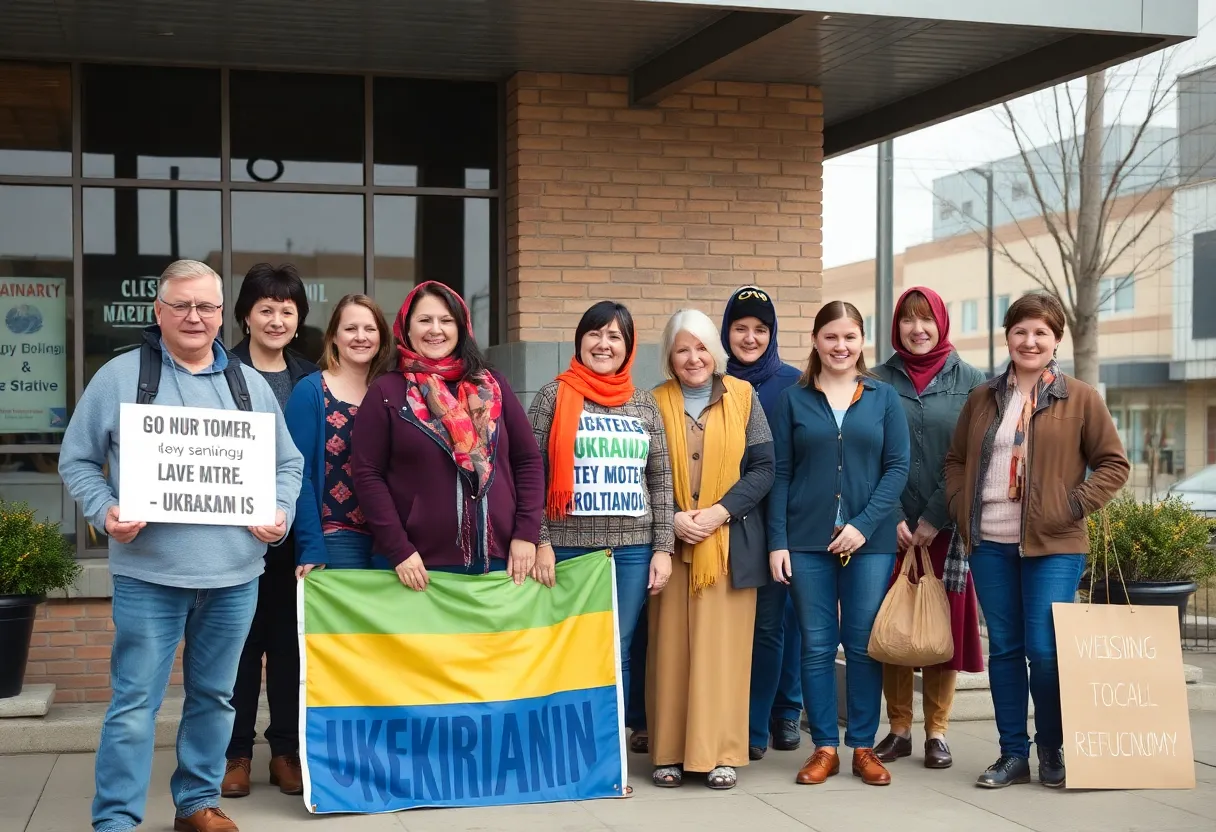Omaha, Nebraska, October 20, 2025
Ukrainian refugees in Omaha are facing the expiration of their temporary legal status, which threatens their work rights and risks deportation. Local aid organizations are rallying to secure extensions, highlighting the economic contributions of these individuals. Federal officials are urging Congress to act swiftly to prevent widespread hardship as many families face uncertainty just three years after fleeing conflict in Ukraine. The situation has sparked mobilization from community groups to address the challenges posed by the complex immigration system, emphasizing the potential economic impact on Nebraska’s workforce.
Omaha, Nebraska: Ukrainian Refugees Face Imminent Loss of Legal Status and Work Rights
Omaha, NE – Ukrainian refugees residing in Nebraska are confronting a critical deadline as their temporary legal status, granted under humanitarian parole, nears expiration. This development, unfolding just three years after many fled Russia’s full-scale invasion of Ukraine, threatens to strip them of essential work authorizations and expose them to potential deportations. Local aid organizations are intensifying efforts to secure extensions, emphasizing the refugees’ vital contributions to the state’s economy, while federal officials call on Congress to intervene swiftly to avert widespread hardship.
The urgency stems from the parole program’s structure, which provides temporary protected status for up to two years, with possible one-year renewals. For many in Nebraska, these extensions are now running out, leaving families in limbo. Without renewed status, individuals risk losing jobs in sectors like agriculture, manufacturing, and services, where they have integrated effectively since arriving. Nebraska’s robust economy, particularly in these areas, has benefited from their labor, with refugees filling roles that support local businesses and communities.
Local Aid Groups Mobilize Support
Community-based aid groups in Omaha and surrounding areas are at the forefront of advocacy, organizing workshops, legal clinics, and awareness campaigns to help refugees navigate the complex immigration system. These organizations highlight stories of families who have rebuilt their lives in Nebraska, contributing through taxes, volunteer work, and cultural enrichment. They argue that abrupt status changes could disrupt not only individual households but also the broader workforce, especially in rural communities where labor shortages persist.
Efforts include partnerships with immigration attorneys to file for alternative protections, such as asylum applications or adjustments under other visa categories. However, these processes are lengthy and uncertain, often taking years to resolve. Aid groups are also lobbying state representatives to amplify their voices in Washington, D.C., underscoring the human cost of inaction. The refugees’ plight has gained traction locally, with community leaders expressing concern over the potential economic ripple effects if deportations occur.
Broader Context of the Crisis
The situation reflects a larger national challenge for Ukrainian parolees, but in Nebraska, it hits particularly close to home. Since the war began in February 2022, thousands of Ukrainians have sought refuge in the U.S., with Nebraska welcoming a notable portion due to its welcoming Midwestern ethos and affordable living. Many arrived with professional skills or a strong work ethic, quickly finding employment and sending remittances back to war-torn families in Ukraine.
Three years post-invasion, the ongoing conflict has prolonged displacement, making return impossible for most. Yet, the parole program’s temporary nature was designed for short-term relief, not long-term resettlement. Federal agencies have extended deadlines in the past, but current delays in policy decisions have heightened anxiety. Officials note that congressional approval is needed for permanent pathways, such as special immigrant visas or legislative reforms, to provide stability.
In Nebraska, the refugee population has enriched diverse communities, from Omaha’s urban centers to the state’s agricultural heartland. Schools have seen an influx of Ukrainian students adapting to new curricula, while local markets and farms rely on their seasonal labor. The potential loss of work rights could exacerbate staffing challenges in an economy already at a high point for manufacturing jobs, as recent reports indicate. Without intervention, families face separation, financial ruin, and the daunting prospect of returning to a volatile homeland.
Calls for Federal Action Intensify
Federal officials have publicly urged Congress to prioritize immigration reforms that address the parole program’s limitations. Bipartisan discussions are underway, but progress remains slow amid competing legislative priorities. In the interim, temporary measures like work permit extensions are under consideration, though no firm timeline exists. For Nebraska’s Ukrainian community, the wait is agonizing, as daily life hangs in the balance.
This crisis underscores the tension between humanitarian needs and immigration policy constraints. As the expiration dates approach, the stakes grow higher, with implications for families, employers, and the state’s social fabric. Continued advocacy from local groups aims to keep the issue visible, pushing for solutions that honor the refugees’ resilience and contributions.
(Word count: 612)
FAQ
What is the main issue facing Ukrainian refugees in Nebraska?
Ukrainian refugees in Nebraska grapple with expiring legal status, threatening their work rights just three years after fleeing war.
How are local aid groups responding to the situation?
Local aid groups push for extensions, highlighting families’ contributions to the economy.
What actions are officials recommending?
Officials urge congressional action to prevent deportations.
Key Features Chart: Ukrainian Refugees in Nebraska
| Feature | Description |
|---|---|
| Legal Status Challenge | Expiring humanitarian parole threatening work rights |
| Timeline | Three years after fleeing war in Ukraine |
| Local Response | Aid groups pushing for extensions and highlighting economic contributions |
| Federal Involvement | Officials urging congressional action to prevent deportations |
| Economic Impact | Refugees’ roles in agriculture, manufacturing, and services |


